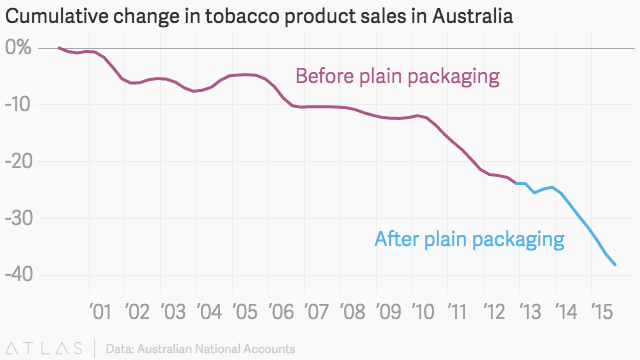http://finance.yahoo.com/news/data-plain-cigarette-packaging-tobacco-162940466.html
Four of the world’s largest tobacco companies are taking on the UK’s decision to require plain packaging for cigarettes, starting in May next year. The outcome of the six-day hearing that starts today (Dec. 10) and is likely to influence similar plans in more than 20 countries.
Big tobacco will make two main arguments: that forcing cigarettes to be sold in plain packages infringes on companies’ intellectual property rights; and that the change won’t lead to a reduction in smoking. On both counts, the UK government should have a robust counter argument.
Plain-packaging rules generally require green or brown boxes without any designs, apart from health warnings and the brand’s name in a plain font. Tobacco companies will struggle to convince the court that this infringes on their intellectual property. British law considers package designs and logos as trademarks, which give firms “the negative right to prevent others from exploiting their brand” explains Enrico Bonadio, a lecturer in law at City University. “This will still be there with the new rules: the government does not touch this right.”
The point about plain packaging not discouraging smokers is also hard to support. Australia introduced plain-packaging rules in 2012, and the data clearly show that this can have an impact, speeding the decline of smoking that is already taking place in many developed countries:
Not all tobacco-control measures work in the same way. Simon Chapman, professor of public health at the University of Sydney, explains how some are quick-acting, like raising taxes or taking cigarettes off shelves. Others are on-going, slow-burn measures like plain-packaging rules. These take longer to have an effect, which can nonetheless be long lasting.
The tobacco companies’ last-ditch court challenge in London will be watched closely by several other countries. (A ruling is likely to be announced early next year.) Apart from the UK and Australia, plain-packaging laws have been passed—but not yet implemented—in France, Hungary, Ireland, and Burkina Faso. A host of other governments are in the earlier stages of introducing similar rules.
